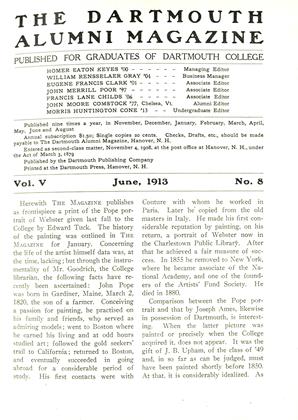Mr. Alfred Noyes, the English poet, whose pleasurable readings from his own works so delighted the College in March, returned to Hanover for a three days' visit on April 28, 29, and 30. The enthusiasm with which he was greeted by undergraduates and faculty alike was no less genuine and unbounded than at his first coming. Students who did not know before that the love of poetry lived within their souls, sat elbow to elbow with the professed reader of pure literature and rejoiced equally with him. The library was besieged for copies of Mr. Noyes's works, and the booksellers laid in supply after supply. That such an awakening must be fruitful in later interest in art and culture cannot be doubted; show the undergraduate that poetry is a living force in the world, and he will wonder why he has so long neglected its study.
On the evenings of the 28th and 30th Mr. Noyes read from his poems; on the 29th he gave a lecture on "The Future of Poetry". His selection of poems was varied and well calculated to arouse interest in all. It ranged from the grotesquely humorous "Black Bill's Honeymoon", through the stirring "Admiral's Ghost" and "The Highwayman", to the quiet tones of "Oxford Revisited"; it covered ballad, descriptive, and purely lyric verse. In all, Mr. Noyes's clear voice, his forceful rhythm, his genuine poetic enthusiasm and love for his work carried his readers out of their prosaic, everyday lives into the land of dreams and bright imaginings.
In his lecture Mr. Noyes set forth his own theory of the function of poetry in the world. He showed himself clearly in line with his great predecessors of the nineteenth century, holding that the poet's purpose, to be true to his calling, must be to bring man into closer touch with the basic harmony of the universe. He must give man faith; he must make him broader, clearer in vision; he must hold him safe against the inroads of skepticism and doubt. Poetry has served this function in the past; that it will continue to do so in the future. Mr. Noyes is confident.
Mr. Noyes was exceedingly well pleased with the reception which the College gave him; the American undergraduate impressed him as more enthusiastic, more expressive than the English. Thus the delight in the visit Was mutual. The pOet has gone away from the College with treasured memories of its hospitality; the College has been awakened, broadened by the presence of the poet.
 View Full Issue
View Full Issue














